Key takeaways:
- Understanding assessment anxiety involves recognizing its roots, such as fear of failure, competitive pressure, and lack of preparation.
- Effective anxiety management techniques include deep breathing, visualization, and maintaining a structured study routine.
- Sharing experiences and practicing self-compassion fosters connection and helps alleviate feelings of inadequacy among students.
- Preparation goes beyond academics; it includes mental and emotional readiness for assessments to enhance performance.
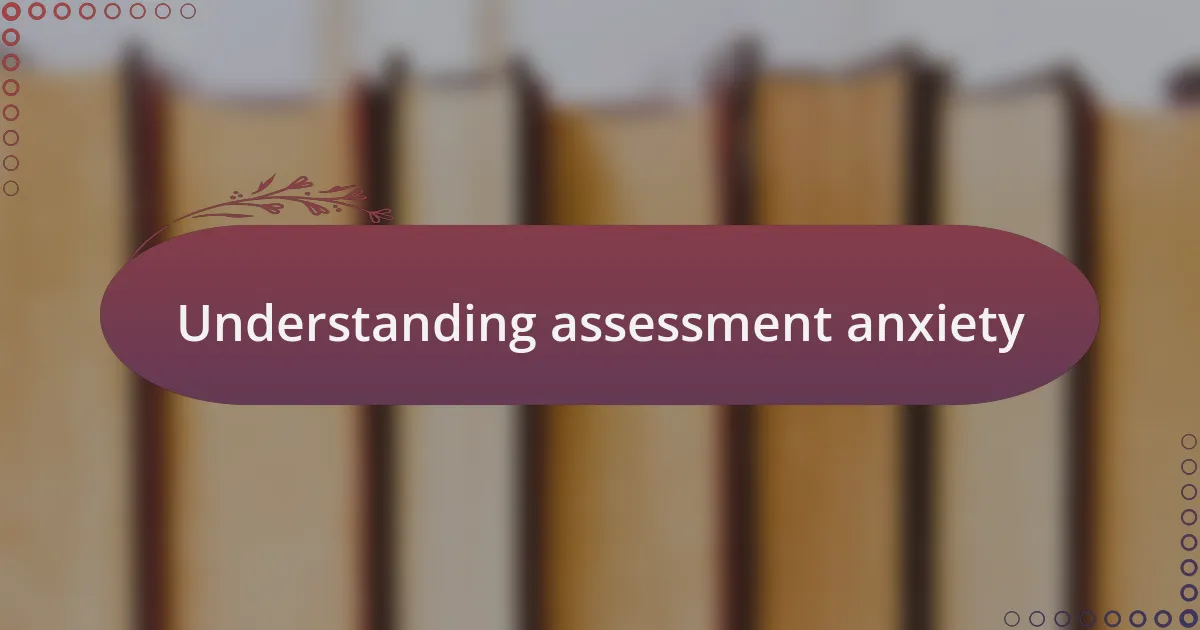
Understanding assessment anxiety
Assessment anxiety is a common experience for many students, often stemming from the fear of failure or the pressure to perform. I remember vividly the nights spent tossing and turning, every thought spiraling into doubt: “What if I blank out during the test?” It’s a cycle that can feel consuming and isolating, but understanding its roots can be the first step toward overcoming it.
Many students face a sense of vulnerability during assessments, making their hearts race and palms sweat. I found comfort in acknowledging that these feelings are not unique. Isn’t it reassuring to know that even the most prepared individuals sometimes struggle with nerves? This shared experience can transform anxiety from a paralyzing force into something more manageable.
Understanding assessment anxiety also involves recognizing how it affects performance. I’ve personally seen how anxious thoughts can cloud my focus and inhibit my ability to recall information. Have you ever forgotten everything you studied the moment you sat down for an exam? This stark realization prompted me to explore strategies that could help me regain control over my anxiety and improve my overall performance.
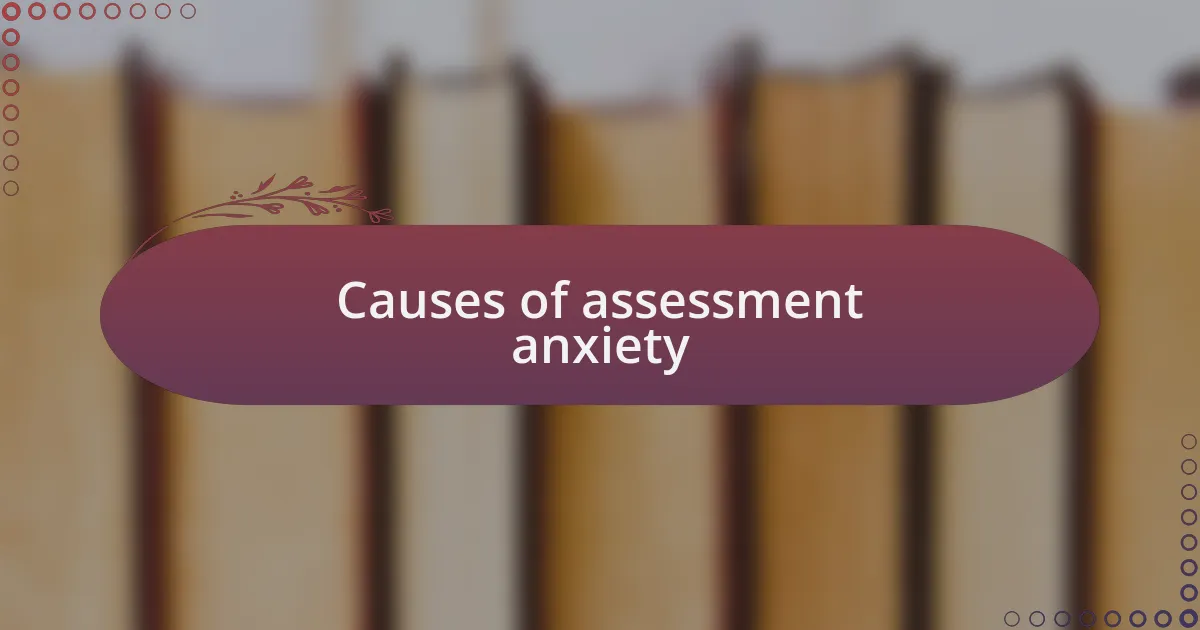
Causes of assessment anxiety
The fear of disappointing oneself or others can be a significant catalyst for assessment anxiety. I recall a time when my parents had high expectations for my performance. The thought of letting them down created a tight knot in my stomach before every test. Have you ever felt that crushing weight of expectation, almost as if the stakes were too high? This pressure can lead to paralyzing anxiety, overshadowing any confidence in one’s preparation.
Another factor that contributes to assessment anxiety is the competitive environment in academic settings. I’ve been in situations where the feeling of rivalry with peers made me second-guess my abilities. Even when I was prepared, the thought of others outperforming me created an undercurrent of anxiety that was hard to shake off. Do you find yourself caught up in comparing your progress to that of your classmates? This habit can undermine our self-worth and fuel a cycle of anxiety.
Additionally, a lack of preparation or understanding of the material can heighten anxiety levels. I remember cramming late into the night before an important exam that I wasn’t entirely ready for. That frantic last-minute effort left me feeling even less secure. When you’re unprepared, doesn’t it feel like you’re walking a tightrope, constantly fearing a fall? Recognizing this cause has reminded me to focus on thorough preparation, which has become essential in reducing my anxiety.
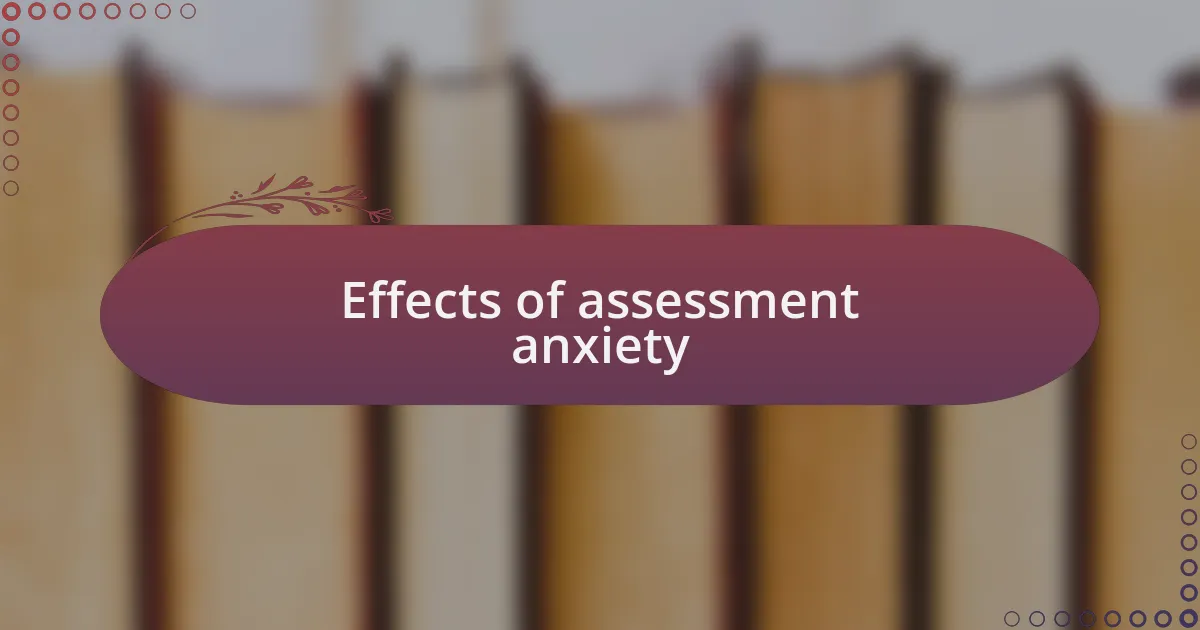
Effects of assessment anxiety
Experiencing assessment anxiety can have profound effects on both mental and physical well-being. I remember how my heart would race, and my palms would sweat at the mere thought of an exam. This heightened state of anxiety often made it difficult for me to concentrate, effectively clouding my ability to think clearly during assessments. Have you noticed how anxiety can transform even the simplest tasks into monumental challenges?
Moreover, the emotional toll of assessment anxiety can lead to a sense of inadequacy and diminished self-esteem. There were times when I doubted my capabilities, feeling that no matter how prepared I was, I would always fall short. It’s like standing at the edge of a cliff, frozen in fear, wondering if I would leap or just stay stuck in my anxiety. I found that this constant fear of failure sometimes discouraged me from even trying, creating a vicious cycle where anxiety bred further anxiety.
The long-term effects can linger well beyond the assessments themselves. I’ve seen friends deal with sleepless nights and decreased motivation to study due to their anxiety. The stress was palpable and often overshadowed by the fear of future evaluations. Have you ever felt the aftershocks of a stressful assessment rippling into other aspects of life? For me, it served as a reminder that addressing this anxiety was crucial for reclaiming control and confidence in my academic journey.
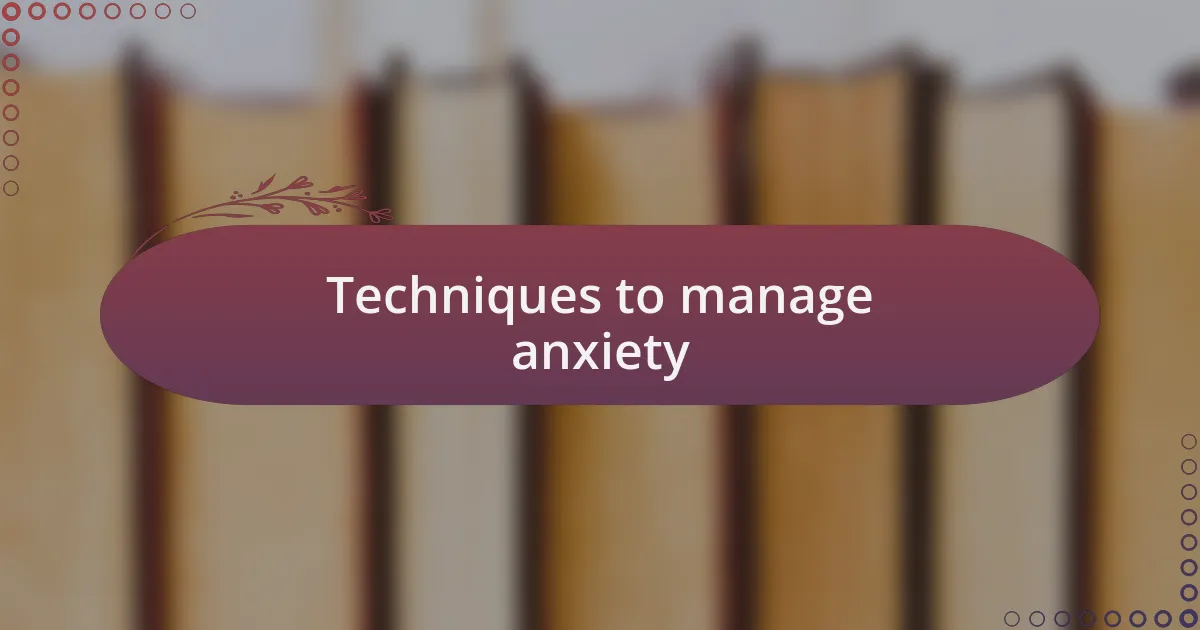
Techniques to manage anxiety
Finding effective techniques to manage anxiety can be a game-changer. One approach that I discovered was deep breathing exercises, which helped me regain focus when I felt overwhelmed. Whenever I felt that tightness in my chest before an assessment, taking a few minutes to breathe in deeply and slowly exhale often brought me back to a calmer state. Have you tried it? It’s simple but surprisingly effective.
Another technique that worked wonders for me was visualization. Before university exams, I would picture myself walking into the exam room with confidence, sitting down, and answering questions with ease. This mental imagery not only boosted my self-assurance but also transformed my mindset from fear to empowerment. How do you envision yourself facing your challenges? Shifting my perspective in this way made a considerable difference in how I approached assessments.
Lastly, I found that maintaining a routine ahead of assessments helped alleviate stress levels. I created a study schedule that included regular breaks and even time for enjoyable activities. By balancing study with self-care, I noticed that my anxiety levels dropped significantly. Have you considered setting a study routine? It’s essential to remember that preparing your mind can be just as important as academic preparation.
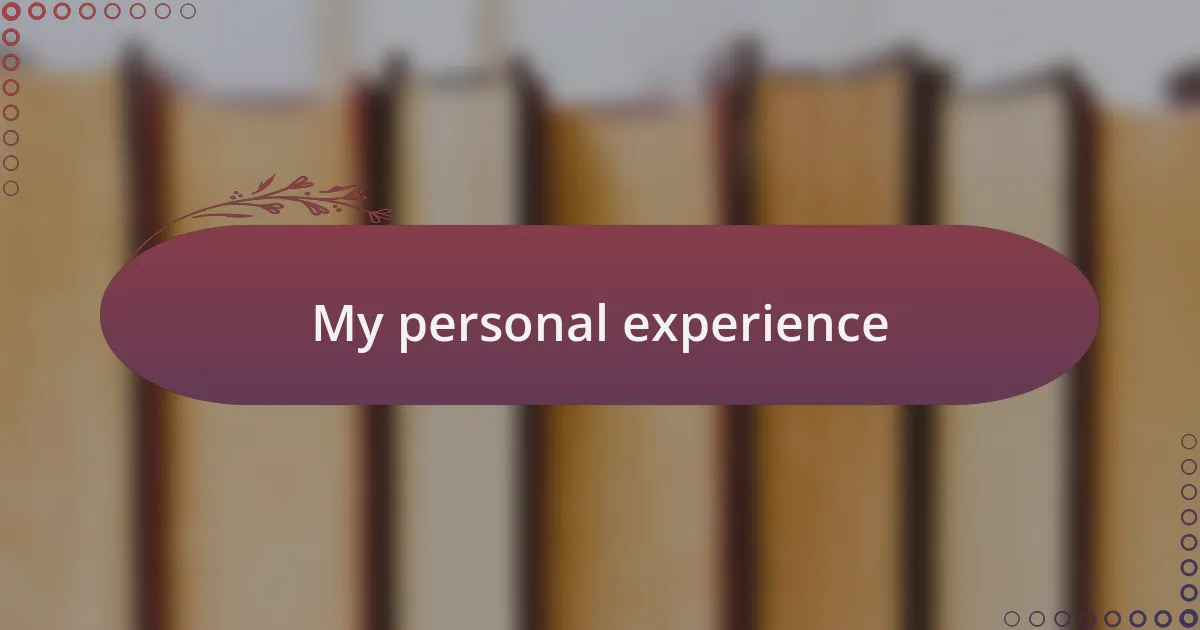
My personal experience
I vividly remember the days leading up to my first major assessment in college. I would lie awake at night, my mind racing with doubts and what-ifs. Those sleepless nights were a whirlwind of anxiety, and I often found myself questioning my ability to succeed. It was during those moments of vulnerability that I learned to catch my breath and shift my focus, transforming panic into calm.
One particular instance stands out. As I sat in the exam hall, the air felt thick with tension. I could practically hear my heart pounding in my ears. Rather than letting that energy consume me, I took a moment to close my eyes, visualize my success, and breathe. What a game-changer that was! Suddenly, I wasn’t just a student facing an exam; I was someone empowered, ready to tackle the questions before me.
Even today, that anxiety still creeps in at times, especially when I’m faced with new challenges. I remind myself of those early experiences and how important it is to balance preparation with mental well-being. Have you ever found yourself caught in that cycle of fear? For me, it’s a gentle nudge to return to those grounding techniques that have become lifesavers over the years.
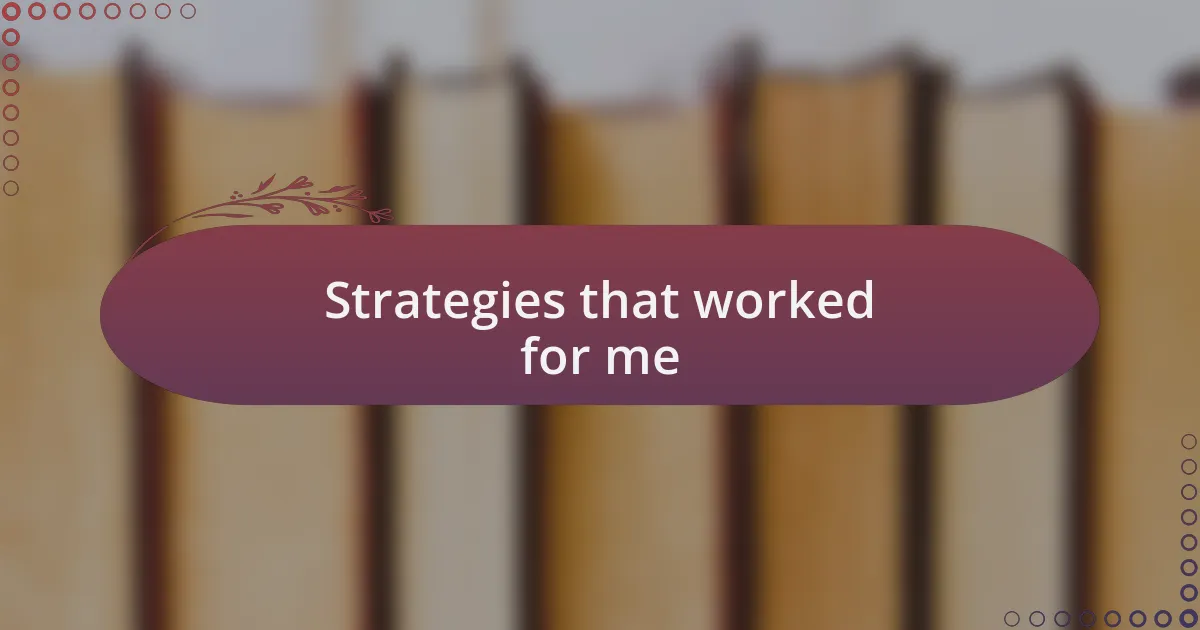
Strategies that worked for me
One strategy that I found invaluable was mindfulness meditation. I remember sitting in my dorm room, feeling overwhelmed with study materials scattered around me. I started dedicating just ten minutes each day to quiet my mind, focusing on my breath. It felt awkward at first, but gradually, I noticed a shift in my mindset. The stress didn’t vanish, but it became more manageable, transforming into a signal for me to pause rather than panic.
Another technique that worked wonders for me was creating a study schedule. Initially, I would cram everything into the last few days, which only amplified my anxiety. By breaking down my study goals into small, achievable tasks spread over weeks, I felt a sense of control and accomplishment. It’s amazing how checking off those tasks on my to-do list provided a satisfying boost of confidence. Have you ever felt the anxiety melt away with just a bit of organization?
I also turned to positive affirmations. Every morning, I would stand in front of the mirror and remind myself of my abilities. Phrases like “I am prepared” and “I can handle this” became part of my routine. The emotional impact was profound; it helped me cultivate self-belief that often faded away during stressful moments. The power of those simple words is something I carry with me even now.

Lessons learned from my journey
Reflecting on my journey, I’ve learned that vulnerability is not a weakness, but a strength. I remember the first time I shared my anxiety with a study group. What surprised me was how many others felt the same way. That moment opened a pathway for connection and support, showing me that we’re not alone in our struggles. Have you ever found strength in sharing your fears with others?
Another lesson I embraced was the importance of self-compassion. There were times when I’d beat myself up over a poor test score, thinking it defined my worth. It was a slow process to shift that mindset, but gradually, I learned to treat myself with the same kindness I would offer a friend. Recognizing that mistakes are part of growth helped me to face challenges with a healthier perspective. How often do we forget to be gentle with ourselves during tough times?
Finally, one key insight was that preparation doesn’t only mean studying; it encompasses mental and emotional readiness as well. I remember establishing a pre-assessment ritual that included a calming playlist and moments of reflection. This routine grounded me, allowing me to enter the exam room centered and focused. I discovered that investing time in my mental state made a significant difference in my performance. Have you thought about how your mindset before an assessment could shape your experience?